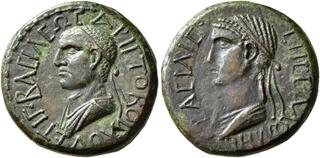| Leu Numismatik AG > Auction 15 | Auction date: 1 June 2024 |
| Lot number: 129 Price realized: This lot is for sale in an upcoming auction - Bid on this lot  | Show similar lots on CoinArchives Find similar lots in upcoming auctions on |
| Lot description: KINGS OF ARMENIA MINOR. Aristobulus, with Salome, 54-92. Tetrachalkon (Bronze, 20 mm, 6.36 g, 1 h), Chalcis (?), RY 13 = 66/7. BACIΛEΩC APICTOBOYΛOY ET IΓ Diademed and draped bust of Aristobulus to left. Rev. BACIΛIC-CHC CAΛΩMHC Diademed and draped bust of Salome to left. Hendin 6289. Kovacs 300. Meshorer 365 corr. (date). RPC I 3840. Extremely rare and among the finest known examples. Boldly struck on a full flan, with fully readable legends and two spectacular portraits. The reverse somewhat smoothed, otherwise, nearly extremely fine. From an important collection of Armenian coins, Leu 7, 24-25 October 2020, 1355. The infamous Jewish princess Salome was the daughter of Herod II and Herodias, a son and a granddaughter of Herod 'the Great'. Her reputation as a devious seductress results from Mark (6:21-28) and Matthew (14:6-11), who describe how Salome performed a captivating erotic dance for Herod Antipas. As a reward, her thrilled stepfather promised her to fulfill any wish she may utter: 'Whatever you ask me for, I will give it to you, up to half my kingdom'. Salome consulted with her mother, Herodias, who told her to ask for the head of John the Baptist, as he had criticized her own divorce from Herod II and her subsequent marriage to Herod Antipas. The tetrarch had previously refused to execute the preacher, but when the teenage girl now demanded his head as a reward for her dance, Herod complied and had one of his bodyguards bring John's head on a platter. A few years later, Salome married Aristobulus, the son of Herod of Chalcis, who was appointed King of Armenia Minor in 54 by Nero. The present coin is one of a few known examples to show the king on the obverse and his queen, Salome, on the reverse. It may have been struck in Aristobulus' capital Nicopolis-ad-Lycum, although it has been suggested that the actual mint may have been Antiochia (Kovacs), or Chalcis (RPC). Estimate: 3500 CHF |  |



